Those who know me would probably find it unsurprising to know that my current favourite pop music artist, Montaigne, goes by a stage name inspired by the french philosopher who made essays popular, and wears shirts that say ANALYSE YOUR WEAKNESSES. As a literature nerd who aspires to emotional awareness, I’m aware that I can be something of a niche audience, and yet somehow, here I have been blessed with pop music of a broad appeal that actually ticks those boxes for me, and for that I am so incredibly stoked.
Montaigne is an absolute star, awarded as “Next Big Thing” by FBi Radio’s SMAC awards in 2015 and “Best Breakthrough Artist” in the 2016 ARIAs, a hype train that I’m sure will only gather even greater momentum as we see more from her. I very rarely resonate so strongly with a musician’s branding as much as I do with Montaigne’s right now, so it seems fitting to share my love for her music by writing an incredibly self-indulgent essay on one of her songs.
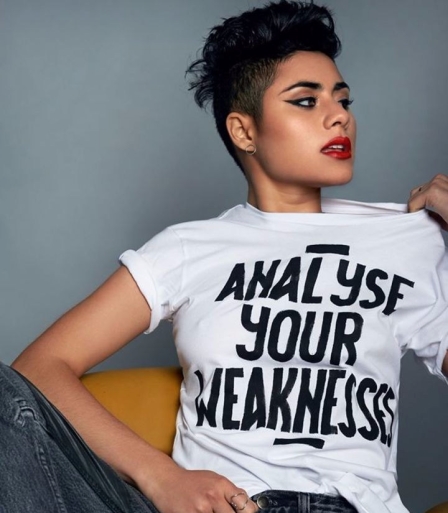
If this shirt isn’t role model material, her eyeliner certainly is
What You Mean to Me is where I started and I recommend it to anyone new. The music video is packed full of both action and depth; on its surface it appears like an urban fantasy adventure flick, with a hero fighting masked assassins to gain control over a glowing orb of power. The lyrics, meanwhile, leap straight into an emotional journey in the heart of a new relationship, using the first line to efficiently establish both a past of turbulent relationships and a present being occupied by a break in that pattern. This is new, I am not used to happy love is a declaration of the environment as it is; the protagonist enters it warily, a foreigner to everything that you are, on the lookout for dangers with nothing but an old battered map for guidance.

This moment of disturbance speaks closely to the experience of confused feelings, ones of trying to navigate a healthy relationship with only external advice and examples to guide yourself by.
I’ve thought all about the times when I had to leave is sung as the masked assassins first appear on screen. This sets these antagonists up as being representative of these intrusive thoughts and moments in the relationship, threats to the happiness and freedom the protagonist is entering into and determined to protect. Meanwhile, the appearance of these antagonists taps heavily into the pop culture imagery of ninjas, the presence of the masks acting as a way to remove the humanity of the figures and transform them into symbols of the ongoing inner conflict. The detail of masks in the uniforms is also be an interesting creative choice, in light of the fact that the costumes are based off a popular myth. This implies that these fears are also ones that are dressed in expectations and lacking in evidence – an implication reinforced by the lines, Because I couldn’t understand what you mean to me/And no, I never understand how I’m feeling. There’s self-deprecation in this; even though the speaker is being very clear about feelings on one axis, she is convinced that she doesn’t possess the self-knowledge she displays through that clarity.
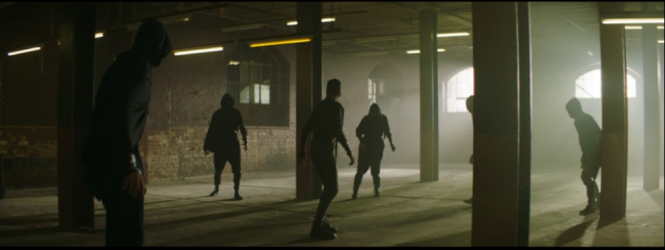
When the tension of the first two verses leads into the chorus, the fight scene really lends a feeling of immediacy to the concepts being explored. The protagonist possesses a resolve that matches that portrayed by the singer. You are right, but not tonight feels as though it’s coming from a powerful place in terms of relationship dynamics; the people involved are not invalidated by their different perspectives, they both exist, and can be unpacked on their own terms. And despite the trepidation of the first verses and the line I never understand how I’m feeling, there is more self-knowledge contained here, a declaration of expertise on her own experiences: Counting down, I feel contrived / on the behalf of every love / that I ever have dreamed of says that she understands herself and her desires a lot better than it might seem, even to herself. That she knows her own history and what has informed all her choices, and they all contribute to who she is as a complete person. This inner strength is represented on screen as the orb of power; the protagonist now takes this in hand and uses it to transport her to a new portion of the battlefield.

The daylight in the previous scene is transformed to night, signalling an advancement in time as well as entering more dangerous territory.
The third verse repeats the motifs of the emotional battle earlier just as the protagonist faces off against the same opponents as before, although this time, she’s better armed. Self-doubt wars with resolve. I don’t know how to read books anymore / I cling not to what I am, but what I was before are an admittance again of the unknown emotional territory and personal weaknesses, but now they’re not just using this as a way to undermine their own understanding of their feelings they did before the first chorus; these weaknesses are acknowledged as a symptom of fear.
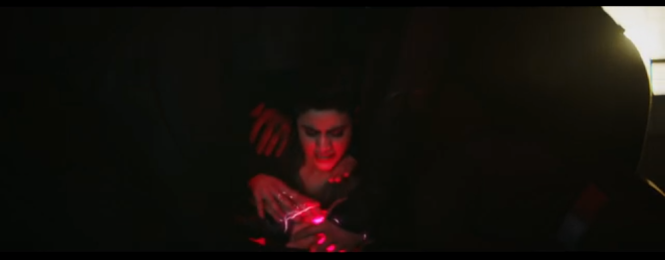
The protagonist is overwhelmed by enemies/fears. The orb turns red in response.
Bleed is also mentioned as a possibility within the relationship that she’s afraid of and avoids; this could refer to being afraid of cutting away things in their relationship in order for it to grow and move forwards, or it could also refer to a fear of feeling pain or sympathy within the relationship – emotions which are difficult and painful to feel, but frequently necessary for the sake of growing closer. Either way, growth and closeness are on the horizon, but they require a sacrifice of comfort to reach. The speaker is still determined to push through this, as these fears around moving forwards are attached to a desire made stronger with each repetition; I never wanna lose what you mean to me / No, I never wanna lose how I’m feeling.
This realisation seems to empower the protagonist to defeat her enemies. Now that she has named her fear, and knows her desires, she has strength to beat them, can acknowledge them and sit with them and move on with her life. Although avoiding all the thought makes it sound as though she might run from those fears instead of confront them, and one moment in the battle threatens to overwhelm her, at the end of it she bursts clear of danger, fights with renewed vigour and eventually knocks the last fighter down, leaving her alone on the battlefield for just a moment to gather her breath.

Enemies lay around her, defeated, and her orb’s colour has returned to normal.
The internal warring of the singer realising that her weaknesses come from her own fear becomes very clearly represented on screen as a villain steps forth, one wearing the same face of the protagonist and carrying another super-powered orb of a different colour.
It’s important to note that this is the same colour that appeared in the protagonist’s orb as she was threatened with being overwhelmed by enemies earlier. This villain is a version of her that has been overwhelmed by her fears, and turned it into a weapon against herself; showing that the greatest threat to the relationship is not external, but self-sabotage.
The bridge leads us from the end of one fight and into the boss battle. Advance my heart, this is all a phase speaks to the nature of this part of new relationships, the teething stage of growth before one moves onto the brunt of something longer-term, while I can react to this for days shows the youth and passion involved, the drama of new relationships and the ways that small things can trip into bigger emotional journeys.
Think me dry is a more challenging turn of phrase to unpack; whether referring to a dry mouth left in the face of anxiety, perhaps nervousness in the face of a crush, or dry in the witty sense – perhaps something they wish they could be, or else a coping mechanism used to deflect much-needed self examination, something the speaker is aware of and criticises with the question do I think at all? at the end of it all. Dryness in the physical sense is notably an imbalanced state, an absence of needed sustenance. It’s quite a different concept to the cockiness of attributing dry wit to oneself, but these dual meanings can both be supported by the context of the song, and also taps into the narrative of conflict and inner dissonance represented onscreen. That implied imbalance is also echoed in I feel lover, I feel small.
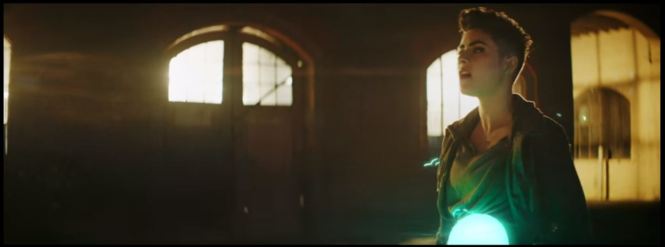
The repetition of this builds into a greater momentum just as the protagonist ‘charges up’ with energy in preparation for the fight. The protagonist is charged up with all the weaknesses, the imbalances and the strengths they’ve discovered in herself across the course of the small narrative. Full of self-doubt as she may be, the fight is at her feet and unlike her flight from the less powerful but more numerous on-screen enemies, she doesn’t look around for an escape anymore. She faces this challenge head-on and unflinchingly.
As the characters engage each other in battle, they blast ethereal power at each other with visuals remniscient of the Harry vs. Voldemort magical duel from Harry Potter and the Deathly Hallows part II. This visual comparison further strengthens the narrative of choosing to between inner weaknesses and inner strengths. Harry Potter is a foil to Voldemort, as someone with the exact same potential who chose to reach for support and love in the face of abuse, and grows as a person; whereas Voldemort, like this possible evil self, has chosen to continue a cycle of abuse and negativity. The protagonists stand in the same place as each other on the screen – although the reversal of colours in the scene implies a shift in values motivating either side. While Harry is motivated by ideas of chivalry and bravery to be a better person, Montaigne’s colours choices imply that the Slytherin values of ambition and resourcefulness are what actually empower her to be her best self.
At the end of the song, the viewers are left without a resolution or a clear winner. The song, though upbeat and cheerful throughout the majority of it all, allows the last underlying note to hover on for a moment longer on the words I feel lover, I feel small.
The ambiguity of the fight and the lyrics at the end are both optimistic and daunting. There is no guarantee that the protagonist will win against her shadow self, or that the speaker’s relationship will continue to be both successful and happy. The fight for happiness is an eternal one, too great and nebulous to be contained within the narrative of a happy ending, but hope for the protagonist endures yet so long as her shadow self hasn’t won either.
The uncontainable vocals of Montaigne against the catchy, pop-structured riffs of the melody are a perfect mirror to these complex ideas and give us a glimpse into her greatness as a true artist; one who can engineer harmony between countless layers of lyrics, visuals and audio to communicate very precise emotional experiences. Montaigne’s music is packed with skill that shows the obvious years of hard work behind it, and is insightful in a way that cannot be manufactured. She gifts us with a message that clearly comes from a very personal and vulnerable place, a song that is a celebration of the strength in uncertainty and vulnerability. There is victory in the ability to be able to dwell on our own smallness while remembering that it exists alongside – and without overshadowing – our capacity for love.
Armed with this message, and with the fire of this sweet melody, we too can fight our shadow selves, and maybe some day, we can win.
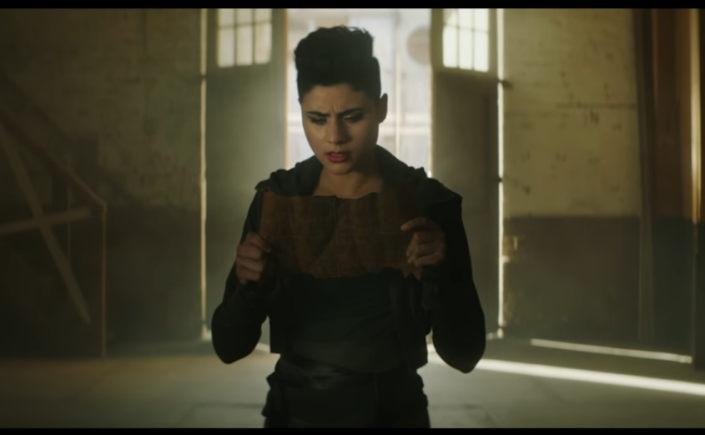




Reblogged this on My Daily Read.
LikeLike
Very interesting critical analysis.
LikeLike